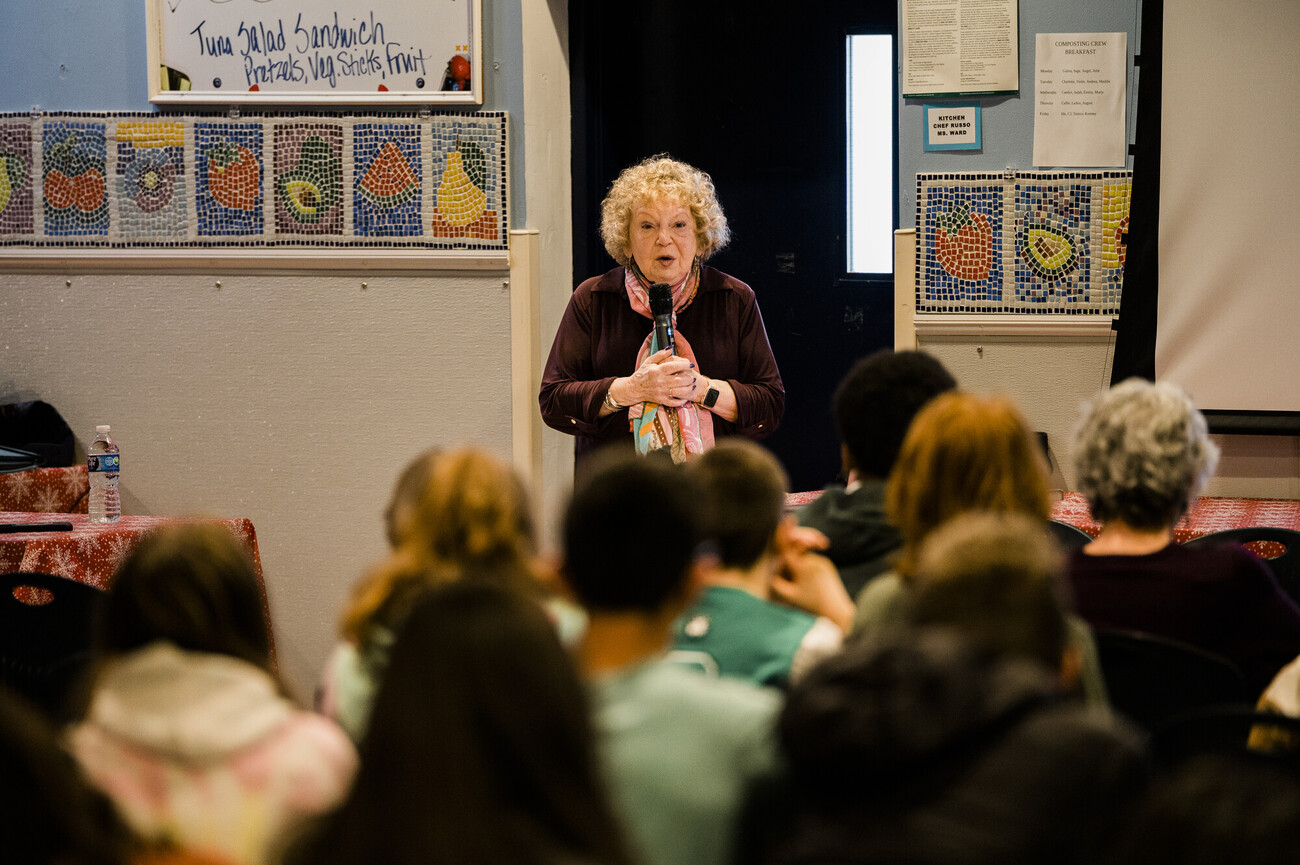Seventh and eighth-grade students at Marblehead Community Charter Public School gathered Friday afternoon with Holocaust survivor Henia Lewin, as she shared her experiences living through the genocide.
Lewin, now 83, was a year and a half old in June 1941 when Nazi Germany invaded her native Lithuania. She was one of the fewer than 2,000 Jewish people in the country to survive the Holocaust.
“I admire her courage to go up there and talk about how she lost almost all her family, and she was able to talk about it and her crazy emotional journey through it too,” said eighth-grader Ellis Purdy, whose great-grandmother was a Holocaust survivor.
Lewin and her family were among the 40,000 Lithuanian Jews herded into the Kovno Ghetto. Lewin recounted how when her mother informed others that the Nazis were killing Jewish people, they called her “crazy.”
“They put 40,000 people in an area, or the ghetto, that was meant for 6,000,” recalled eighth-grader Molly Bullard. “So, there’d be six families living in a one-family house.”
By year’s end, half of the ghetto’s residents were dead, including Lewin’s grandparents, aunts, uncles, and cousins. The students recalled the moment Lewin spoke about one of her cousins being born and immediately brought into the ghetto, to be hidden behind walls from the Nazis.
Even 80 years after the Holocaust, Lewin was emotional and affected by the stories she lived through, according to Nick Santoro, an eighth-grade humanities teacher at MCCPS. Santoro spoke with Lewin after her presentation and heard that Lewin had trouble telling her stories for many years.
“The first few times she did it, it was like she couldn’t get through the presentation, it was extremely challenging,” said Santoro. “Then by continuously doing it, she found this sort of therapy from sharing it and the impact that sharing her story has… By the time she told it to us, she could go on and on and on and not be so emotionally impacted, at least on the surface. I imagine underneath the surface, it’s still there.”
“There were a few times where I felt like I saw, I can tell somethings are harder for her to talk about,” he added. “When she talked about her mom and the sacrifices her mom made there would be these pauses.”
Lewin recalled many close calls where she almost lost her life. On another occasion, when she was 3-years-old, she was sedated by her mother who smuggled her out of the ghetto inside a leather suitcase, before going back for the rest of the children to hand them over to a priest.
“I feel like a lot of the extremities you see in the movies, it happened here,” said Purdy. “Like, she got into a suitcase and she was smuggled away past bribes and stuff. That’s what happens in movies.”
“She herself remembering that, for 70-some-odd years, her family died… that’s a big weight to bear on someone’s shoulders,” added Purdy.
During the presentation, Lewin demonstrated some of the photos she was able to keep and maintain through the years, including some with her family members.
“She showed us photos of her family, and there was one photo at a wedding where there was like 20-something people in the photo, and only nine of them made it out alive,” said Bullard.
“That’s just kind of crazy to think about that, because we saw some photos of these people as kids, as adults, and then now, a lot of them aren’t here,” added Bullard.
“It was also amazing to see how sudden certain stuff was. Like, she’d show you a picture of just like a happy family together. And then six months later this happened,” added seventh-grader Dylan Ries.
Students found it interesting to hear Lewin’s stories firsthand.
Seventh-grader Mika Rabinovich said it was interesting to hear and see Lewin talk about her experiences in person, rather than reading a book or watching a video about the Holocaust.
Lewin’s presentation continued after school hours, and Santoro was impressed that more than half of the students that Friday afternoon decided to stay for it.
“I think we’re lucky that we were able to meet her and hear her story firsthand,” said Bullard.
Office Manager Meg Upton and Santoro have a mission to bring guest speakers to expose students to culturally significant events, groups, and individuals to expand their horizons and augment their project-based learning at the school.
“As time goes on, the more interactions we have with this material are books, video games, movies, and it becomes less and less personal and more and more general,” said Santoro. “Then, I think also just to share the value of sharing one’s story with other people, and to have those burdens carried by a community and not just the individual I think can be a powerful message.”

